
March 21
1848 German Unification: A complicated revolution aimed at creating a unified Germany takes place. At issue: will it take the shape of a Greater Germany, or a Greater Austria, or just a German Confederation without Austria at all? As Austria is not willing to relinquish its German-speaking territories to what would become the German Empire of 1848, the crown of the newly formed empire is offered to the Prussian King Friedrich Wilhelm IV.Austria.
1885 From the Scientific American:
Dupuy de Lôme (Naval designer) conceived and carried out the bolder scheme of designing a full-powered screw liner, and in 1847 Le Napoléon was ordered. Her success made the steam reconstruction of the fleets of the world a necessity. She was launched in 1850, tried in 1852, and attained a speed of nearly 14 knots (26 km/h). During the Crimean War her performances attracted great attention, and the type she represented was largely increased in numbers. She was about 240 ft (73 m). in length, 55 ft (17 m). in breadth, and of 5,000 tons displacement, with two gun decks. In her design boldness and prudence were well combined. The good qualities of the sailing line-of-battle ships which had been secured by the genius of Sané and his colleagues were maintained; while the new conditions involved in the introduction of steam power and large coal supply were thoroughly fulfilled.
[See: Countdown to Infamy: Timeline to Pearl Harbor.]1911 Death: Johanna Poelzl (Hitler's aunt): Hitler's half-sister, Angela, who is providing for his full-sister Paula, as well as her own three children, files a claim for the remains of Aunt Johanna's estate, noting that Hitler had previously received the large sum of 924 Kronen from her in 1907, to fund his 'studies' in Vienna. [For further details, Click here.]
1915 World War I: : Click here for the March 21, 1915 issue of the Canadian newspaper Family Herald, featuring many articles and pictures relating to the War.
1917 World War I: War at Sea: Another American ship, the Healdon, is sunk off the Dutch coast.
World War I: Click here for the March 21, 1917 issue of the superior American periodical The Outlook, featuring many articles relating to the War by the finest jounalists and commentators of the day.
1918 World War I: Various:
Second Battle of the Somme: At 4:40 in the morning, the German army launches another 'great offensive' in the Second Battle of the Somme. After a 5-hour bombardment, six thousand German heavy guns open up with high explosives and gas shells along a 100 miles of front as the first of five massive assaults is about to be launched. The stunned British fall back, allowing the German Eighteenth Army to pass the Somme. Over a million German soldiers eagerly await the word to attack. Five hours later, under cover of fog, specially trained Storm Troops lead the way. The German army drives forward on a front nearly a hundred miles wide and overruns the British forward machine gun posts almost unobserved, striking the right flank of the British sector between Arras and La Fere. Within hours the whole British line begins to crumble. [For Ludendorff on the Spring Offensive click here]
Paul von Hindenburg on the Opening of the German Spring Offensive:
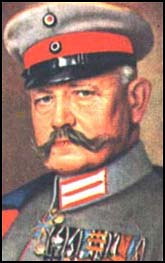
The beautiful bright weather of early spring which we had been enjoying had changed. Violent rainstorms swept over the country. They did full justice to the nickname which the French had given to Avesnes and its neighbourhood. In themselves clouds and rain were by no means unwelcome to us in these days. They would probably shroud our final preparations. But had we really any grounds for hoping that the enemy had not got wind of what we were about? Here and there the hostile artillery had been particularly wide-awake and lively. But the firing had then died down. From time to time enemy airmen at night had tried to observe the most important of our roads with the help of light-balls and turned their machine-guns on all suspected movements. But all this supplied no definite data on which to answer the question: "Can our surprise succeed?
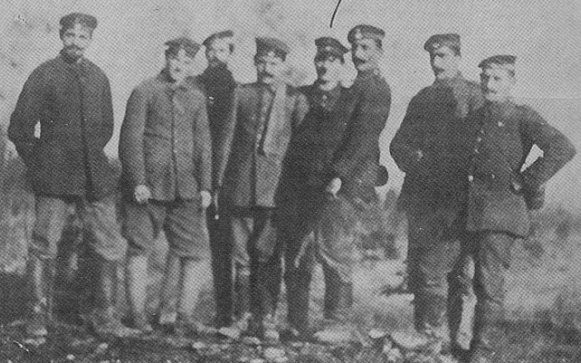
Gefreiter Adolf Hitler's 16th RIR [List Regiment] comrade Adolf Meyer:
[In the morning a] most violent German artillery barrage was launched to our right . . . . The great battle for France had broken out. From La Fere to Croiselles, the German attack had commenced over a front of 70 kilometres. At 10 in the morning, the regiment already had news that the German offensive had gained an overall success . . . . It was clear to all of us that in a brief time we too would set out on the advance. [For further details, Click here.]
USA: The Railway Control Act is passed:Every railroad not owned, controlled, or operated by another carrier company, and which has heretofore competed for traffic with a railroad or railroads of which the President has taken possession, use, and control, or which connects with such railroads and is engaged as a common carrier in general transportation, shall be held and considered as within 'Federal control,' as herein defined, and necessary for the prosecution of the war.
1919 World War I: The Final Dispatch by Sir Douglas Haig, British Commander-in-Chief:
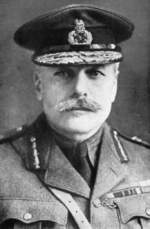
Doubtless, the end might have come sooner had we been able to develop the military resources of our Empire more rapidly and with a higher degree of concentration, or had not the defection of Russia in 1917 given our enemies a new lease of life. So far as the military situation is concerned, in spite of the great accession of strength which Germany received as the result of the defection of Russia, the battles of 1916 and 1917 had so far weakened her armies that the effort they made in 1918 was insufficient to secure victory. Moreover, the effect of the battles of 1916 and 1917 was not confined to loss of German man-power. The moral effects of those battles were enormous, both in the German Army and in Germany. By their means our soldiers established over the German soldier a moral superiority which they held in an ever-increasing degree until the end of the war.
1933 Various:
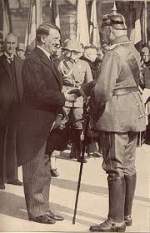
Church and Reich: Hitler and Hindenburg attend elaborate ceremonies in Potsdam, celebrating the new Reichstag. Hitler and Goebbels intentionally fail to attend special Catholic services. An official communiqué explains that they feel obliged to absent themselves because Catholic bishops in a number of recent declarations had called Hitler and members of the NSDAP renegades of the Church, who should not be admitted to the sacraments. "To this day, these declarations have not been retracted and the Catholic clergy continues to act accordingly to them." (THP) [See: Was Adolf Hitler a Christian?]
The German Communist Party (KPD) is eliminated, giving the Nazis an absolute majority in the Reichstag. Several Communists are imprisoned at a munitions plant near Oranienburg, nine miles north of Berlin. This camp will close in 1935. (THP) [See: How Did Adolf Hitler Consolidate his Power?]
Anglo-Italian and Anglo-French meeting in Geneva on the maintenance of peace in Europe: The British plan contains the following proposals: (1) Duration of the pact - five years. (2) Reduction of arms production and prohibition of rearmament. (3) International control to see that each signatory fulfills the conditions. (4) Creation of a permanent organization to seek new methods of limiting armaments. (5) Establishment of fundamental political co-operation among the Great Powers on the basis of a growing mutual trust.
1934 Boycott: The American Jewish Congress and New York Central Labor Council establish the Joint Boycott Enforcement Council against German goods and services. (THP)
1937 Various:
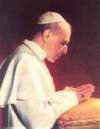
Church and Reich: Mit brennender Sorge is read from the pulpits of all Catholic Churches in Germany on Palm Sunday. It has been smuggled into Germany, secretly printed and distributed by messenger throughout the nation. "With deep anxiety and with ever-growing dismay" Pius XI says he has watched the tribulations of the Catholic Church in Germany. The Concordat of 1933 is now being openly violated, and the conscience of the faithful oppressed as never before. True belief in God, the Pope declares, is irreconcilable with the deification of earthly values such as race, people or the state. Important as these are in the natural order, they can never be the ultimate norm of all things. Belief in a national God or a national religion, similarly is a grave error. The God of Christianity cannot be imprisoned "within the frontiers of a single people, within the pedigree of one single race." (THP)
Poland: The Polish Senate passes a law making it illegal for Jews to manufacture, distribute or sell Catholic religious materials. (THP)
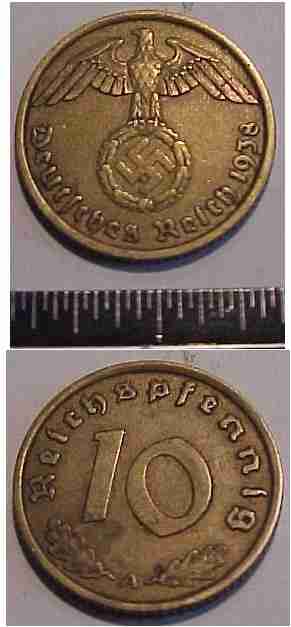
1937 Hjalmar Schacht addresses the employees of the former Austrian National Bank on the occasion of its obliteration as an independent institution:
I think it is quite useful if we recall these things to our mind in order to expose all the sanctimonious hypocrisy exuding from the foreign press. Thank God, these things could after all not hinder the great German people on their way, for Adolf Hitler has created a communion of German will and German thought. He has bolstered it up with the newly strengthened Wehrmacht, and he has thereby given the external aspect to the inner union between Germany and Austria. I am known for sometimes expressing thoughts which give offense; nor would I care to depart from this custom today . . . .
I know that there are even here in this country a few people—I believe they are not too numerous—who find fault with the events of the last few days. But nobody, I believe, doubts the goal; and it should be said to all hecklers that you cannot satisfy everybody. There are those who say they would have done it in some other way, perhaps, but strange to say they did not do it (hilarity) it was done by our Adolf Hitler (Long, continued applause); and if there is still something left to be improved, then those hecklers should try to bring about these improvements from within the German Reich and the German community and not disturb it from without . . . . The Reichsbank will always be nothing but National Socialist, or I shall cease to be its manager. (Heavy, protracted applause) . . . .
I ask you to raise your hands and to repeat after me: I swear that: I will be faithful, and obedient to the Fuehrer of the German Reich and the German people, Adolf Hitler, and will perform my duties conscientiously and selflessly . . . . You have taken this pledge. A scoundrel, he who breaks it. To our Fuehrer a triple Sieg heil. (IMT) [See: Beware Schacht.]
1938 Holocaust: Lichtenburg concentration camp near Prettin (Torgau) reopens. (THP)
1939 Various:
Free City of Memel is transferred to Germany:
The serious farmers and fishermen greeted the Fuehrer silently in an empty factory, with arms raised. They listened in silence. If one did not know them, one might think that the speaker had failed to reach them. But after that, East Prussia voted National Socialist and had probably the best vote totals in the whole country. The most distant bastion of Germandom is the Memel District.
Poland: Sir Howard Kennard, British Ambassador in Warsaw, offers in the name of his government, what is called a Pact of Consultation and Resistance that includes Great Britain, France, Poland and the Soviet Union.
1940 World War II: Paul Reynaud vice-president of the Alliance Democratique center-right party, becomes the penultimate Prime Minister of the Third Republic when he forms a new French government.
1941 Various:
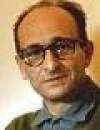
Holocaust: Adolf Eichmann, in a meeting at the Propaganda Ministry, refers to Reinhard Heydrich as being in charge of the "final evacuation of the Jews" to the Government General. Note: There is only one conceivable way to have a "final evacuation of the Jews" and simultaneously to make the Government General free of Jews. (See March 17) (THP)
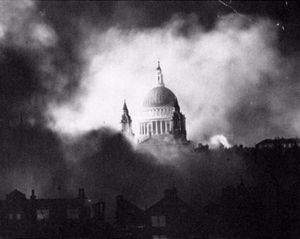
World War II: The South-East of England is hit by the Luftwaffe's new Spring bombing blitz: A deliberate attempt is made to destroy Buckingham Palace by, first dropping incendiary flares, then following with flying bomb runs, but the palace escapes a direct hit. [See: Why Did Hitler Lose The Battle of Britain?]
1943 A second military plot to kill Hitler foiled:
On this day, the second military conspiracy plan to assassinate Hitler in a week fails to come off.
Back in the summer of 1941, Maj. Gen. Henning von Tresckow, a member of Gen. Fedor von Bock's Army Group Center, was the leader of one of many conspiracies against Adolf Hitler. Along with his staff officer, Lt. Fabian von Schlabrendorff, and two other conspirators, both of old German families who also believed Hitler was leading Germany to humiliation, Tresckow had planned to arrest the Fuhrer when he visited the Army Group's headquarters at Borisov, in the Soviet Union. But their naivete in such matters became evident when Hitler showed up—surrounded by SS bodyguards and driven in one of a fleet of cars. They never got near him.
Tresckow would try again on March 13, 1943, in a plot called Operation Flash. This time, Tresckow, Schlabrendorff, et al., were stationed in Smolensk, still in the USSR. Hitler was planning to fly back to Rastenburg, Germany, from Vinnitsa, in the USSR. A stopover was planned at Smolensk, during which the Fuhrer was to be handed a parcel bomb by an unwitting officer thinking it was a gift of liquor for two senior officers at Rastenburg. All went according to plan and Hitler's plane took off-—the bomb was set to go off somewhere over Minsk. At that point, co-conspirators in Berlin were ready to take control of the central government at the mention of the code word "Flash." Unfortunately, the bomb never went off at all—the detonator was defective.
A week later on March 21, on Heroes' Memorial Day, (a holiday honoring German World War I dead), Tresckow selected Col. Freiherr von Gersdorff to act as a suicide bomber at the Zeughaus Museum in Berlin, where Hitler was to attend the annual memorial dedication. With a bomb planted in each of his two coat pockets, Gersdorff was to sidle up to Hitler as he reviewed the memorials and ignite the bombs, taking the dictator out—along with himself and everyone in the immediate vicinity. Schlabrendorff supplied Gersdorff with bombs—each with a 10-minute fuse.
Once at the exhibition hall, Gersdorff was informed that the Fuhrer was to inspect the exhibits for only eight minutes—not enough time for the fuses to melt down. (History.com)
1945 Death: Arthur Nebe: SS General and head the criminal police (KRIPO) from 1933 to 1945. Nebe was a professional policeman who had already reached the rank of Police Commissioner by 1924. Even before Hitler came to power, he had close connections to the SS group led by Kurt Daluege, and in April 1933, was recommended by Daluege for the position of Chief Executive of the State Police. Nebe quickly set about reorganizing the criminal police in the Third Reich and played a major role in establishing the totalitarian police system. In June 1941, he was given command of Einsatzgruppe B, which was headquartered in Minsk, and during the next five months, was responsible for 46,000 executions in White Russia. Thinking that he was implicated in the July bomb plot, Nebe disappeared in early 1945, and according to official records was executed in Berlin on March 21, 1945. Yet, several sightings and rumors of his activities continued into the late 1960's. Shortly after the war an amateur film showing a gas chamber supplied with gas from the exhaust of a truck was allegedly found in his former Berlin apartment. (THP)
1946 Nuremberg Tribunal: Hermann Goering endures effective cross-examination by the Prosecution:
Sir David Maxwell-Fyfe: Do you still seek to justify and glorify Hitler after he had ordered the murder of these 50 young flying officers at Stalag Luft Number III?
Goering: I am here neither to justify the Fuehrer Adolf Hitler nor to glorify him. I am here only to emphasize that I remained faithful to him, for I believe in keeping one's oath not in good times only, but also in bad times when it is much more difficult. As to your reference to the 50 airmen, I never opposed the Fuehrer so clearly and strongly as in this matter, and I gave him my views about it. After that no conversation between the Fuehrer and myself took place for months.
Sir David Maxwell-Fyfe: The Fuehrer, at any rate, must have had full knowledge of what was happening with regard to concentration camps, the treatment of the Jews, and the treatment of the workers, must he not?
Goering: I already mentioned it as my opinion that the Fuehrer did not know about details in concentration camps, about atrocities as described here. As far as I know him, I do not believe he was informed. But insofar as he . . .
Sir David Maxwell-Fyfe: I am not asking about details; I am asking about the murder of four or five million people. Are you suggesting that nobody in power in Germany, except Himmler and perhaps Kaltenbrunner, knew about that?
Goering: I am still of the opinion that the Fuehrer did not know about these figures.
1953 Spandau Prison: From Spandau: The Secret Diaries, by Albert Speer: Today as we were planting a chestnut sapling Funk said, "We'll be here to sit in the shadow of this tree." (Speer II)
1958 Spandau Prison: From Spandau: The Secret Diaries, by Albert Speer: Today—I could scarcely believe my ears—Schirach suddenly began whistling 'Lili Marlene' again. He had let up on it for some eight months. If only this isn't a new outbreak. (Speer II)
1980 Carter announces Olympic boycott:
On this day in 1980, President Jimmy Carter announces that the U.S. will boycott the Olympic Games scheduled to take place in Moscow that summer. The announcement came after the Soviet Union failed to comply with Carter's February 20, 1980, deadline to withdraw its troops from Afghanistan. [For further information, click here]
Edited by Levi Bookin (Copy editor)
levi.bookin@gmail.com
Disclaimer: This site includes diverse and controversial materials--such as excerpts from the writings of racists and anti-Semites--so that its readers can learn the nature and extent of hate and anti-Semitic discourse. It is our sincere belief that only the informed citizen can prevail over the ignorance of Racialist "thought." Far from approving these writings, this site condemns racism in all of its forms and manifestations.
Fair Use Notice: This site may contain copyrighted material the use of which has not always been specifically authorized by the copyright owner. We are making such material available in our efforts to advance understanding of historical, political, human rights, economic, democracy, scientific, environmental, and social justice issues, etc. We believe this constitutes a "fair use" of any such copyrighted material as provided for in section 107 of the US Copyright Law. In accordance with Title 17 U.S.C. Section 107, the material on this site is distributed without profit to those who have expressed a prior interest in receiving the included information for research and educational purposes. If you wish to use copyrighted material from this site for purposes of your own that go beyond 'fair use', you must obtain permission from the copyright owner.
Please Note: The list-owner and the moderator of 3rdReichStudies are not responsible for, and do not necessarily approve of, the random ads placed on our pages by our web server. They are the unfortunate price one pays for a 'free' website.